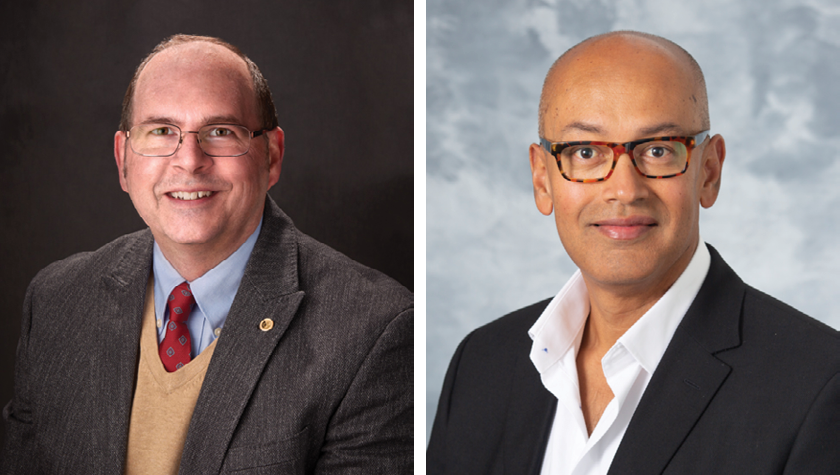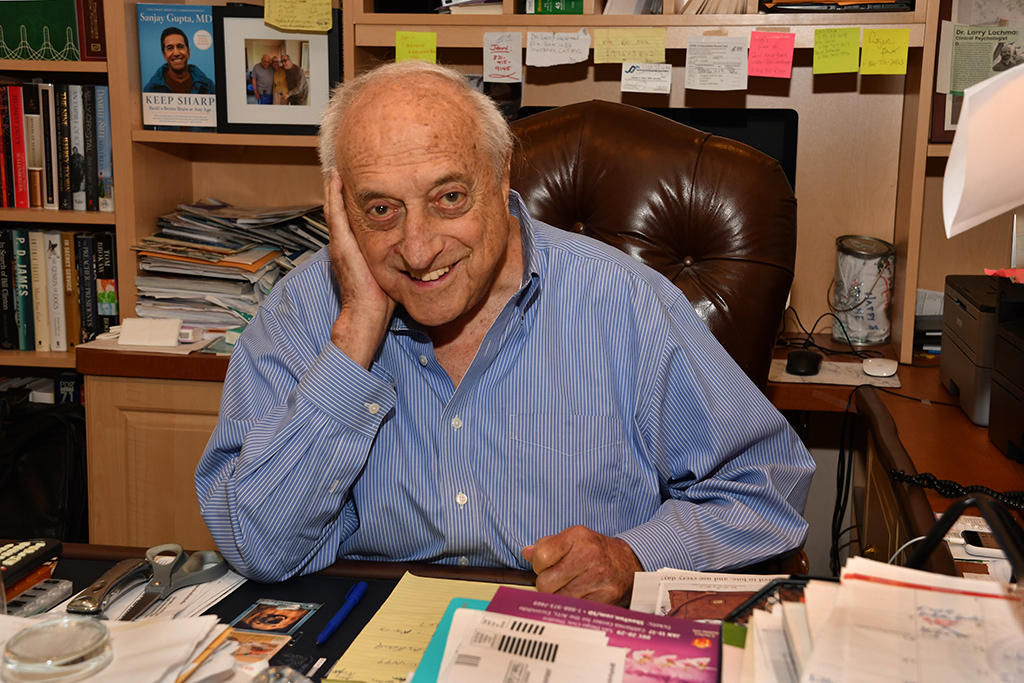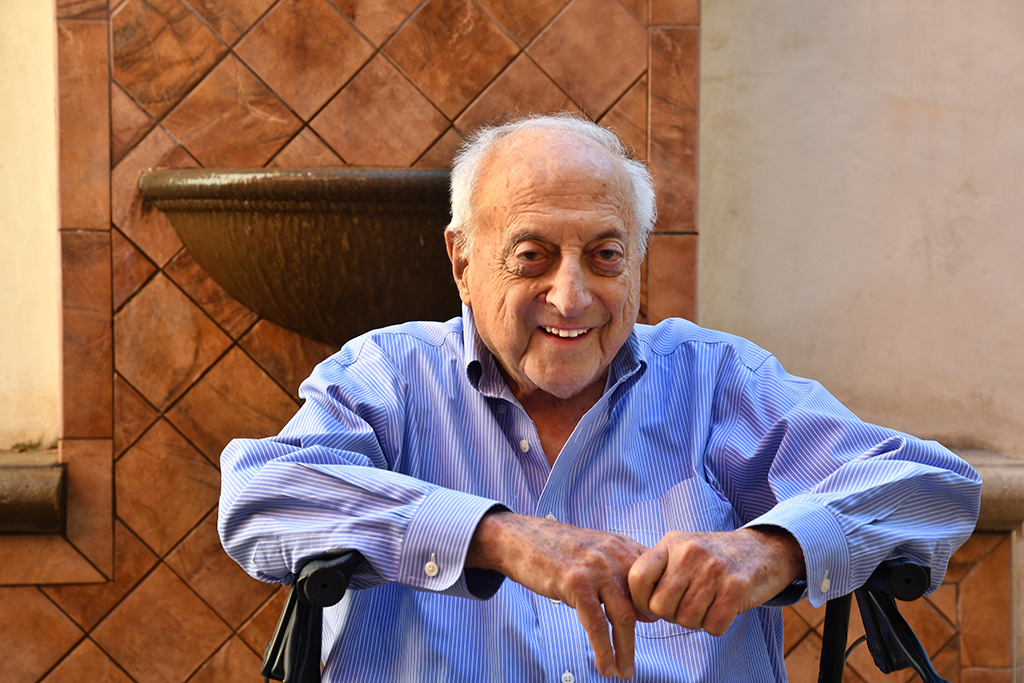Through the support of renowned alum Leon Lachman, the Institute harnesses expertise and enhances collaboration to move therapies from the lab into the clinic
By Katie Gerhards
The University of Wisconsin–Madison School of Pharmacy is launching a new center to leverage expertise across the School’s Pharmaceutical Sciences Division and greater UW–Madison campus community to advance the development of new drugs.
The new Lachman Institute for Pharmaceutical Development — made possible by renowned leader in dosage form design Leon Lachman (PhD ’56) — consolidates research into drug discovery, drug action, and drug delivery to accelerate the progress of new therapies from labs and into clinic settings.

“The Institute is based on the collective strengths of the different research centers across the School of Pharmacy, pulling them together under one umbrella to leverage our varied expertise, increase visibility, and combine forces into a streamlined and powerful drug development engine,” says Ed Elder, administrative director of the Lachman Institute.
The new Institute will increase visibility of drug development projects, create a cohesive alliance for collaborative grant submissions, and establish an umbrella structure to coordinate multidisciplinary research and instrumentation needs for conducting drug development that extends beyond the scope of the Institute’s individual affiliates.
“The Institute is based on the collective strengths of the different research centers across the School of Pharmacy, pulling them together under one umbrella to leverage our varied expertise, increase visibility, and combine forces into a streamlined and powerful drug development engine.”
—Ed Elder
“The UW–Madison School of Pharmacy has a strong focus on leading-edge pharmaceutical discovery and development, with world-renowned faculty and a home on a campus that consistently ranks as one of the best in the world for research productivity,” says School of Pharmacy Dean Steve Swanson. “With the establishment of the Lachman Institute, we can further augment our capabilities, leverage new collaborations, and be better positioned to stay on the frontlines of innovation.”

With a particular focus on biotherapeutics and nanotechnology-based drug delivery systems, along with related analytical techniques, the Lachman Institute will provide specialized capabilities to enable nanoparticle delivery for chemotherapy drugs, immunotherapy, cell therapy, and therapeutic genes.
“People know about the successful drug discovery research enterprise at the UW–Madison School of Pharmacy, but they may not be as familiar with the extension of that into drug development, when we look at what it takes to move a drug from the laboratory into the clinic,” says Elder. “As an academic center, we are uniquely equipped for drug delivery and drug formulation work, which we can more effectively leverage through this new institute.”
A global leader and innovator
As a teenager growing up in New York, Lachman — the namesake and donor behind the new institute — was first exposed to the field of pharmacy when he helped deliver medications for local pharmacies.
With his interest piqued, he pursued pharmacy education at Columbia University, where he earned a bachelor’s and master’s degree in industrial pharmacy. Through his schooling, Lachman evolved a love of pharmaceutical research, which at the time was shifting from a trial-and-error approach, to a more empirically based, controlled scientific study approach that allowed researchers to discover new things while increasing the safety and efficacy of pharmaceutical products.

As he contemplated opportunities to continue his pharmaceutical education, the UW–Madison School of Pharmacy stood out.
“I had a phenomenal professor; that’s why I went for my PhD in physical and physical-organic chemistry at Wisconsin,” Lachman says. He says he was treated like family by his research mentor, Professor Takeru Higuchi, who supported each of his graduate students to grow both academically and personally.
After graduation, he spent more than a decade in leadership at the CIBA Pharmaceutical Company; Endo Laboratories, a division of DuPont; and United Laboratories in Manila, Philippines. In 1979, he launched Lachman Consultant Services, which became one of the largest and most influential firms in the field, offering technical expertise to the pharmaceutical and allied health industries to help develop “good manufacturing practice” facilities and respond to Food and Drug Administration audits.
“Lachman Consultants allowed me to continue in the applied pharmaceutical sciences to help pharmaceutical companies worldwide be compliant with FDA regulations to produce safe and effective pharmaceutical products for peoples around the world,” he says.
Throughout his 50-plus year career, he’s produced more than 70 publications, numerous textbooks, and 11 patents around pharmaceutical testing and dosage form design, and he accumulated various honors and accolades, including the 1979 Research Achievement Award in Pharmaceutics from the American Pharmacists Association Academy of Pharmaceutical Sciences Research and a 2003 Citation of Merit from the UW–Madison School of Pharmacy.
Leaving a legacy
Now retired, Lachman is stewarding arts and sciences, serving as a chancellor’s associate at the University of California San Diego and a member of the president’s council for Scripps Health San Diego, while maintaining involvement with the San Diego Opera, San Diego Youth Symphony, and the La Jolla Cultural Partners Association.
Driven by his experience as a graduate student, Lachman has also long supported the School. He first established a fellowship fund to support graduate students in the School’s Pharmaceutical Sciences program in 2006, growing the fund over the years to provide a full academic year of support to five students each year.

“We should encourage not only the practice of pharmacy, but also research in pharmacy and pharmaceutical sciences,” says Lachman.
By establishing the Lachman Institute, he continues his support of the School, its research enterprise, and its students. Elder says he and other members of the Institute are establishing ways to incorporate Pharmaceutical Sciences graduate students to give them real-world experience in moving pharmaceutical development projects forward.
“With highly diverse research expertise, the School is uniquely positioned to provide an excellent environment for highly collaborative research,” says Professor Seungpyo Hong, director of the School’s Wisconsin Center for NanoBioSystems (WisCNano), which will be one of the core participants in the Lachman Institute.
“Pharmaceutical sciences clearly require a ‘melting pot’ of multi-disciplinary approaches, ranging from chemistry, biology, medicine, and engineering,” says Hong. “The Lachman Institute will provide an exceptional hub to facilitate that melting pot.”
“We’re excited to see what our new powerhouse can do to advance research and development of lab-to-clinic therapies.”
—Ed Elder
In addition to WisCNano, a collaborative research center devoted to nanotechnology-based platforms to prevent and monitor various diseases, the Lachman Institute for Pharmaceutical Development will also comprise the School of Pharmacy’s Medicinal Chemistry Center, focused on the design and synthesis of novel small molecule-based therapeutics; Analytical Instrumentation Center, which offers state-of-the-art instrumentation and ancillary equipment and expertise in their operation; and Zeeh Pharmaceutical Experiment Station, which provides pharmaceutical and biotechnology development-related services to on- and off-campus partners.
The Institute will also engage the School’s Division of Pharmacy Professional Development and the new UW Transdisciplinary Center for Research in Psychoactive Substances, as well as partners across the UW–Madison campus, such as the College of Agriculture and Life Sciences, Carbone Cancer Center, Materials Science Center at the College of Engineering, Molecular Structure Laboratory at the Department of Chemistry, the Office of Business Engagement, the Institute for Clinical and Translational Research, and WARF Therapeutics.
“We’re excited to see what our new powerhouse can do to advance research and development of lab-to-clinic therapies,” says Elder. “With our campus partners, we’re positioned to make significant contributions to patient care through innovative drug therapies.”